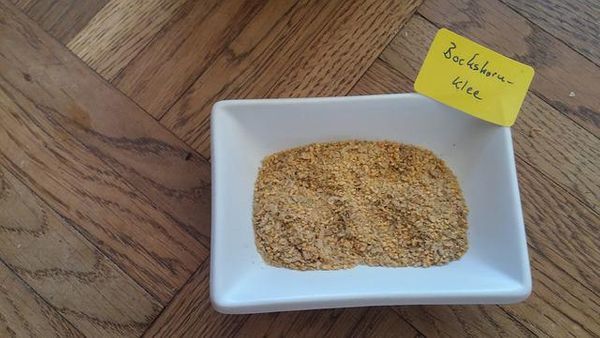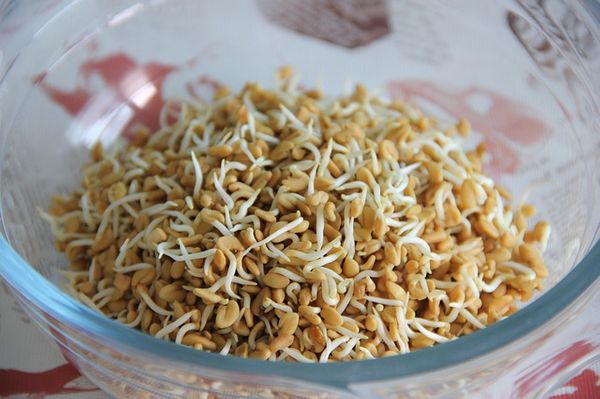A plant called fenugreek grows to a height of around 2-3 feet (60-90 cm). It contains small, white blooms, green leaves, and pods filled with tiny, golden-brown seeds. (Source) Fenugreek has been used for thousands of years in complementary and Chinese medicine to treat a wide range of illnesses, including skin issues. (Source)
It is now a widely used thickening agent and spice in households. Given their nutritious value and mildly sweet, nutty flavor, fenugreek seeds and powder are frequently utilized in many Indian cuisines. (Source) Yes, there are many health benefits of fenugreek. Let’s check them all along with the nutrition and a few health facts.
Fenugreek Effects On Breastmilk Production
Breast milk is the best source of nutrition for your baby’s development. (Source) However, some mothers could have trouble producing enough. According to research, fenugreek might be a secure, all-natural way to enhance breast milk. A herbal beverage containing fenugreek seeds was proven to improve breast milk production in 14-day research including 77 new moms, which assisted newborns in gaining more weight.
A different study divided 66 mothers into three categories. One was given fenugreek tea, the other a placebo, while the third received no treatment. In the fenugreek group, the amount of pumped breast milk increased from roughly 1.15 ounces (34 ml) in the control and placebo groups to 2.47 ounces (73 ml). (Source) Although supplements are expected to have similar effects, these investigations employed fenugreek herbal tea instead of them. (Source)
Health Benefits of Fenugreek and Testosterone Levels In Men
Increasing testosterone is one of the most popular reasons why men take fenugreek pills. According to some research, it has positive effects, including a raised libido. In an 8-week trial, 30 college-aged guys lifted weights four times per week while receiving 500 mg of fenugreek daily from half of the participants. In a 6-week trial, 30 men received 600 mg of fenugreek extract to gauge changes in libido and sexual function. (Source) The majority of subjects reported enhanced sexual function and increased strength. (Source)

Fenugreek May Help Control Diabetes And Blood Sugar Levels
Metabolic disorders like diabetes may benefit from fenugreek. Along with raising general carb tolerance in persons without these illnesses, it appears to affect both types 1 and 2 diabetes. In one study, type 1 diabetics consumed 50 grams of fenugreek seed powder at lunch and dinner. Participants’ blood sugar levels and total and LDL (bad) cholesterol levels improved after 10 days. (Source)
In a different trial, those without diabetes took fenugreek. Their blood sugar levels dropped by 13.4%.
Also Read: Health Benefits Of Cardamom: Nutrition, Health Facts & Downside
Fenugreek Benefits in Weight Loss and Appetite Control:
Three trials to date indicate a decrease in appetite and dietary fat for those who consume fenugreek. Participants in 14-day research spontaneously cut their intake of total fat by 17%. (Source) Some research suggests that Fenugreek may help decrease cholesterol and triglyceride levels.
Fenugreek Health Benefits in Heartburn
Fenugreek improved the symptoms of recurrent heartburn, according to 2-week pilot research. In actuality, it had effects similar to antacid drugs. (Source)
Nutrition And Nutritional Values Of Fenugreek

According to the Spice Board India, 100g of Fenugreek has the following nutrients. There are precise estimates of nutritional values contained in the spices.
- Water (g) 8.84
- Food energy (Kcal) 323
- Protein (g) 23.00
- Fat (g) 6.41
- Carbohydrates (g) 58.35
- Ash (g) 3.40
- Calcium (g) 0.176
- Phosphorus (mg) 296
- Sodium (mg) 67
- Potassium (mg) 770
- Iron (mg) 33.53 (Source)
Downside Of Fenugreek
For healthy individuals, fenugreek seems to be relatively harmless. However, less serious side effects like diarrhea and indigestion have been anecdotally documented, like with most supplements. People may also lose their appetite, which could be dangerous if they have an eating disorder or are attempting to gain weight.
According to animal research, extremely high doses can have a variety of negative side effects, such as DNA damage, lower fertility, neurological issues, and a higher risk of miscarriage.
These were some of the health benefits of Cardamom. Explore healthy facts about Indian Spices at Healthy Spices.





